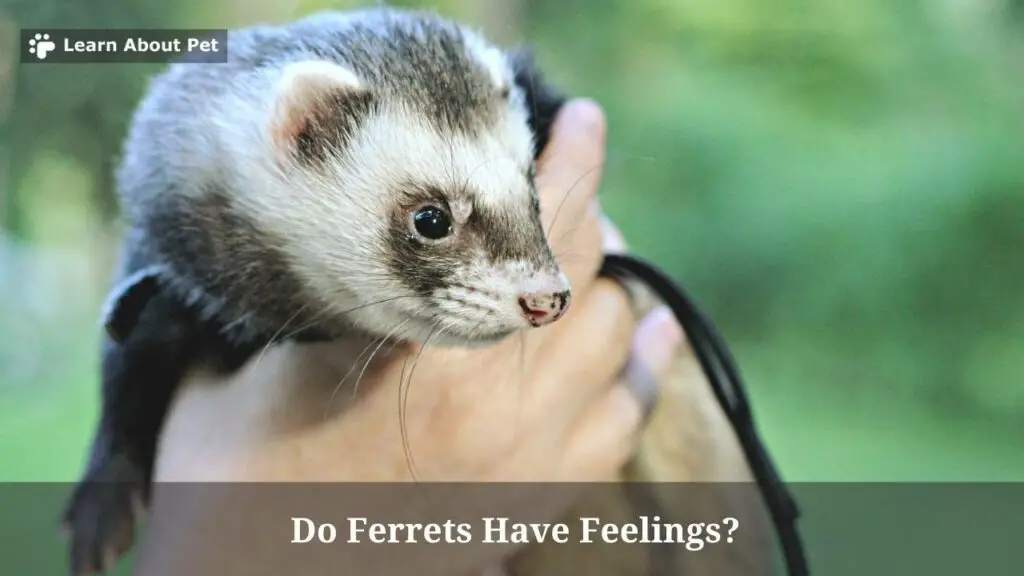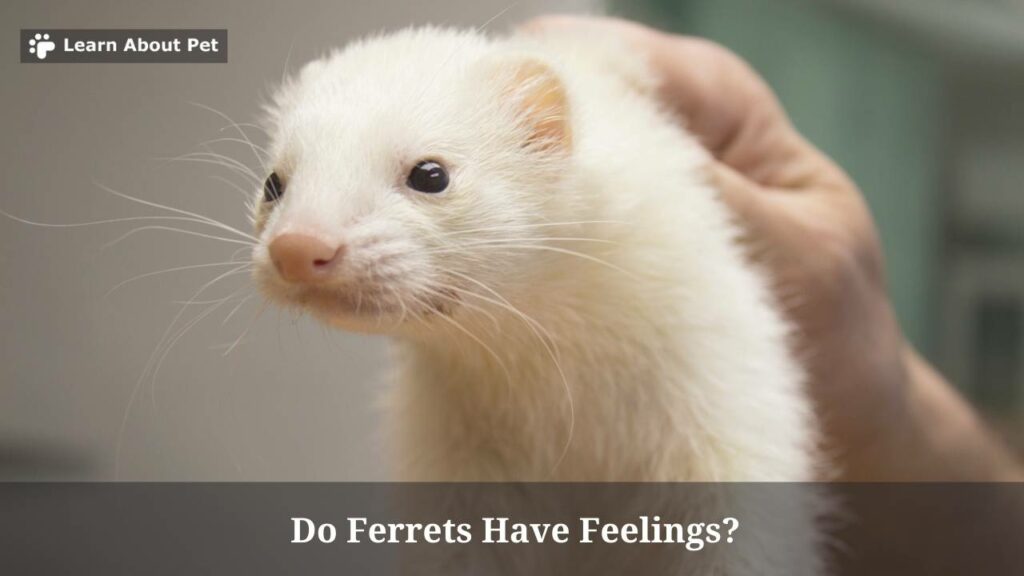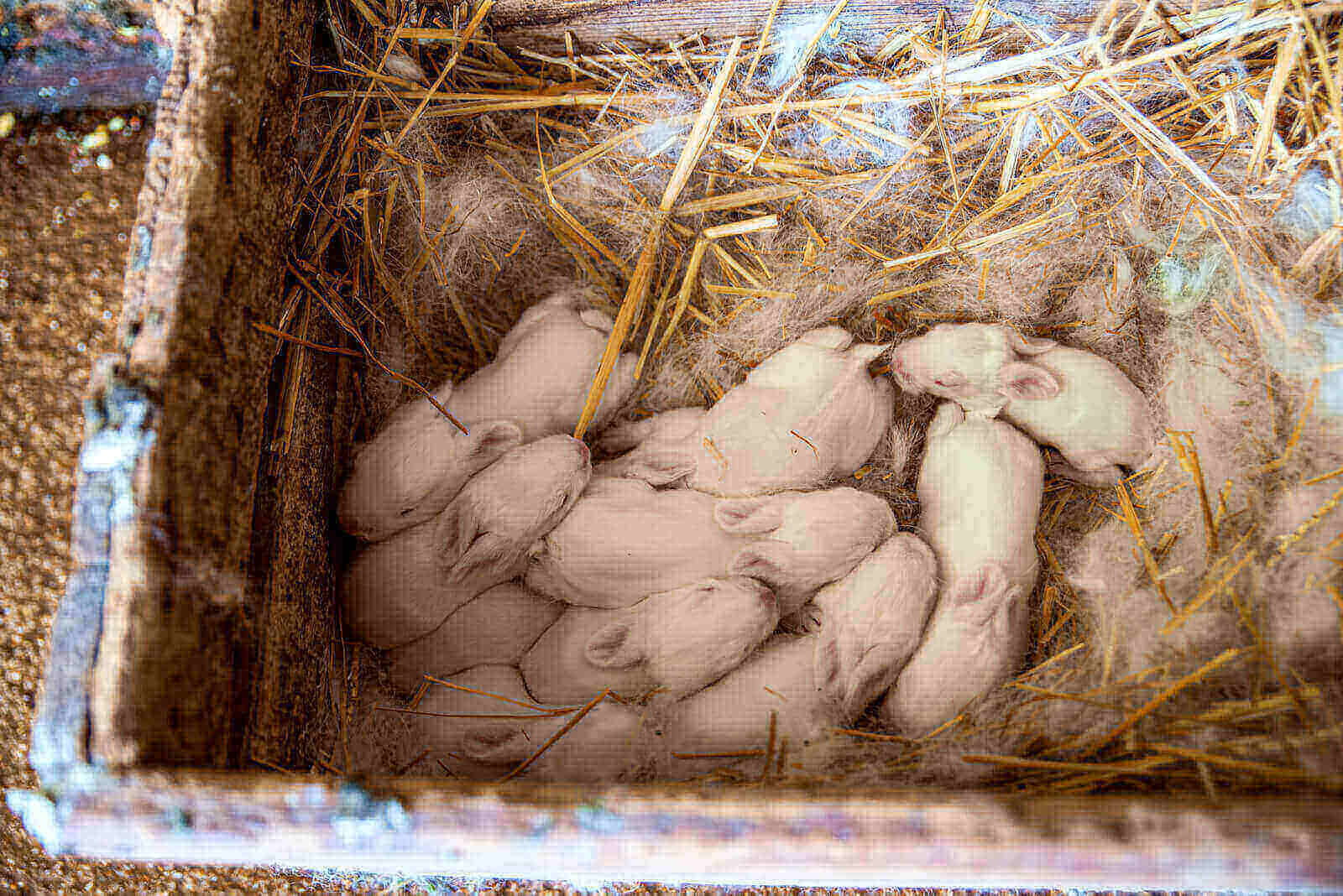One of the most frequently asked questions about ferrets is on whether they have feelings. This article explores that subject.
Do ferrets have feelings? Knowledge on whether ferrets have feelings can be helpful to people who are thinking of adopting the ferrets as pets. Most people prefer pets that are capable of having and exhibiting various emotions.
So that is why people who are considering taking up ferrets as pets may have an interest in knowing whether the ferrets have feelings.

People who already have pet ferrets may also have an interest in knowing whether the ferrets have feelings. Such knowledge can be helpful when working out how to interact with the ferrets on a day to day basis.
Can Ferrets Experience Emotions?
Ferrets are capable of experiencing emotions.
For instance, when a ferret wants something, and it fails to get it, it may show some grumpiness.
Similarly, if you have more than one ferret, and one of them happens to die, the remaining ones may show profound grief.
On another note, when a ferret wants to have something, and it actually gets it, it usually exhibits happiness.
There are also times when ferrets may show signs of excitement: especially at the prospect of getting something they like.
So, yes, ferrets do experience emotions.
People who have interacted with ferrets for any reasonable period of time will have realized that ferrets do experience emotions.
But people who are still new to ferrets (or are considering acquiring ferrets) often lack the knowledge on the ferrets’ emotional side.
So that is why you find them asking questions like, do ferrets have emotions (or are ferrets emotional).
However, it takes only a short interaction with ferrets to realize that they really do experience emotions.
Do Ferrets Have Feelings?
So far, we have said that ferrets do experience various emotions.
But, in certain contexts, experiencing emotions and ‘having feelings’ can have different meanings.
Thus the do ferrets have emotions and the do ferrets have feelings questions need to be addressed at different levels.
So far, we have addressed the do ferrets have emotions aspect. We said they do experience emotions. Now we need to focus on the other aspect: of whether ferrets have feelings.
Do ferrets have feelings? Yes, ferrets do have feelings. They are capable of being happy, sad, depressed, fearful, angry, excited and so on. The ferrets also seem to be capable of loving, hating, fearing and showing other complex feelings.
Earlier, while answering the do ferrets have emotions question, we said that they do. We went further to say that there are times when ferrets show unmistakable signs of being happy, excited, sad, depressed, grieving and so on.
That is what became clear earlier on, while we were answering the do ferrets have emotions questions.
Applying what we found out then in this context, it would follow that ferrets really do have feelings.
And in practical terms, this means that when dealing with a ferret, you need to remember that it has feelings – and truly avoid hurting its feelings.
Which Sorts Of Feelings Do Ferrets Have?
Ferrets have a wide range of feelings.
The ferret feelings range from positive ones like happiness, excitement and love to negative ones like sadness, grief, depression and hate.
So in ferrets, you find almost all major feelings that complex animals are capable of experiencing.
Here, someone may ask, can ferrets feel love? Or, to put it differently, do ferrets feel affection?
And the answer is ‘yes’ – which is why they tend to react positively to people they perceive as ‘loving’. Conversely, they sometimes react in somewhat negative ways to people they are yet to form good bonds with.
Thus if you were wondering, do ferrets know you love them, then the answer is ‘yes’ for the most part…
All in all, the feelings that ferrets have include happiness, sadness, excitement, grief, love, depression… and so on.
It is worth remembering that even in the wild, ferrets are social animals. So they live in groups. To coexist in such groups, complex emotional mechanisms are necessary.
That is the basis for the ferrets being capable of having such a wide range of emotions.
How Do Ferrets Show Their Feelings?
Earlier, in answering the do ferrets have feelings question, we saw that the answer is in the affirmative. Ferrets do have feelings – a wide range of them.
But as we all know, having feelings and actually showing feelings are two different things. Hence this question, on how ferrets show their feelings.
Now there are many ways in which ferrets show their feelings. Those include through their movements (or lack thereof), through their postures, through their facial expressions and even through the emission of certain odors.
If ferrets are excited, they may show the feeling by jumping around – including making the weasel war dance.
Ferrets that are happy will tend to hold their heads up, while being moderately active.
If a ferret is unhappy, it may turn lethargic, and refuse to move about. Or if its particularly unhappy, it may make angry movements – including the so called ferret cage rage movements.
A very unhappy ferret may even start biting, as a way of showing its irritation…
Ferrets that are grieving will tend to be grumpy. They may take to lying with toys that were owned by the departed cage-mates.
Ferrets that are having negative emotions may also tend to refuse to eat.
So there is a wide range of ways in which the ferrets show their feelings.
How Do Ferrets Show Affection?
We have said that ferrets have a wide array of ways in which they show their feelings.
More specifically, one may ask, how do ferrets show affection (or, in simpler terms, how do ferrets show love)?
This turns out to be typically by moving towards – rather than running from – the objects of their affection.
Thus with regard to how can ferrets show affection, that is normally by showing ‘attraction’ rather than ‘repulsion’ tendencies.
Generally, if a ferret loves you, it will tend to move towards you. This is normally in a manner which suggests that the ferret wants you to pet/handle it.
Conversely, a ferret that doesn’t (yet) love you may tend to move away from you every time you approach.
Thus if you were wondering, how do I know if my ferret loves me, those are the reactions to watch out for.
You however need to know that there are times when the ferret may tend to move away from you, in spite of it loving you. So there are times when it just wants to be left alone.
However, if you find a scenario in which the ferret consistently tries to flee whenever it senses your presence, then it may not yet be comfortable with you. It may not yet have developed affection for you.

How Do Ferrets Show Happiness?
When ferrets are happy, they tend to hold their heads up.
Ferrets that are happy tend to have moderate levels of movement. So they are neither lethargic (which is a sign of unhappiness) nor are they making frantic/frenzied movements (which is a sign of agitation/unhappiness).
However, there are cases in which we find particularly happy/excited ferrets jumping. Sometimes, they engage in the popular weasel war dances. All these are still signs of happiness in ferrets.
How Do Ferrets Show Unhappiness?
When ferrets are unhappy, they tend to become lethargic. So they just lie around, without making much movement.
The unhappy ferrets may also tend to show reduced appetite. Some may actually refuse to eat altogether.
In extreme cases of unhappiness – when it degenerates into agitation – the ferrets may start having cage rage. So they keep on making frenzied movements, stomping around and throwing their cage furniture around.
It is also not uncommon for ferrets that are particularly unhappy to start having biting tendencies.
How Do Ferrets Grieve?
There are several ways in which ferrets grieve.
For instance, the grieving ferrets may take to lying with toys that were owned by their department cage-mates.
It is also in the grieving context that we sometimes see the worst ferret depression symptoms. Those range from things like not eating at all to being extremely withdrawn and lethargic.
Do Ferrets Bond With Their Owners?
The subject of whether ferrets really bond with their owners is one that arouses lots of debate.
In response to that question (which can be rephrased as do ferrets get attached to their owners), there are those who swear that they do. And there are also those who feel that ferrets don’t really bond with their owners.
So, what is the true position? Do ferrets recognize their owners? And do ferrets love their owners in due course?
The answer is that most ferrets seem to bond with their owners. Evidence for this is in the fact that they react differently to their owners. And when their owners are not around, they sometimes show signs of some sadness.
So this only goes to show that they do bond with their owners.
There are intellectual feats that ferrets are incapable of, and others that are within their ability. If, for instance, the question was do ferrets recognize their names, the answer would probably be ‘no’ – at least for the average ferret.
But with regard to the ferrets recognizing their owners – who are really their caregivers and their benefactors – that tends to be much easier for the ferrets. So ferrets do recognize their owners, and eventually bond with them.
Can Ferrets Sense Their Owners Emotions?
We have established that ferrets are capable of bonding with their owners.
The question that follows is on how deeply the ferrets bond with the owners. Can Ferrets sense emotions and do they react like other pets? For instance, can ferrets tell when you’re sad (and offer support the way dogs do)?
The answer is that the ferrets seem to be capable of sensing their owners’ emotions. That is why, for instance, when you are unwell, you will tend to find your ferret coming to lie next to you, and seeming to offer emotional support…
Therefore ferrets do at least sense some of their owners’ emotions, if not all.
Final Verdict – Do Ferrets Have Feelings
Ferrets do have emotions. The emotions that ferrets seem to have range from happiness and excitement to the likes of sadness, anger and fear.
Ferrets also seem to be capable of experiencing (and even showing) complex emotions like love and hatred.
Consequently ferrets are able to bond with their owners. They often also openly show some level of aversion to people they are not yet familiar with.
The way ferrets show their feelings include through their behaviors, postures and even facial expressions.
Ferrets may show positive emotions through things like holding their heads up, jumping around in an excited manner (like in the weasel war dance), eating well and being moderately active.

On the other hand, ferrets may show negative emotions through things like lethargy (or too much agitated activity), loss of appetite, grumpiness and withdrawal.
Sometimes, ferret illness can be mistaken for a display of negative emotions.
Thus if, for instance, a ferret shows sustained unhappiness through signs like lethargy, loss of appetite or withdrawal for too long, it may be ill, rather than just being emotionally unhappy.
As a pet lover, make sure to learn about pet more and give your pet ferret a good and comfortable life!

Welcome to Learn About Pet. My name is Rajkumar Ravichandran and I love all pets, travel, and amazing food. I write about my passion and personal experience caring for multiple pets in this blog! ❤️
Post Disclaimer
DISCLAIMER: THIS BLOG OR WEBSITE, "Learn About Pet", DOES NOT PROVIDE YOU WITH MEDICAL ADVICE AND IS NOT A SUBSTITUTE FOR MEDICAL ADVICE. ALWAYS GET IN TOUCH WITH YOUR PERSONAL VETERINARIAN AND USE INFORMATION HERE AS GENERAL ADVICE.
The information, including but not limited to, text, graphics, images and other material contained on this website are for informational purposes only. No material on this site is intended to be a substitute for professional veterinary advice, food recommendation, diagnosis, or treatment. Always seek the advice of your veterinarian or other qualified health care provider with any questions you may have regarding a medical condition or for pet food related questions.







